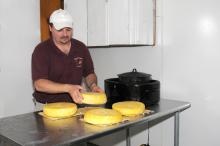Information Possibly Outdated
The information presented on this page was originally released on June 24, 2010. It may not be outdated, but please search our site for more current information. If you plan to quote or reference this information in a publication, please check with the Extension specialist or author before proceeding.
Dairy producer finds value in working with Extension
By Patti Drapala
MSU Ag Communications
POPLARVILLE – Butch Smith grew up on a dairy farm, chose a different career path and then found helping his daughters with their 4-H Dairy Project made him yearn to go back to working with cows.
Smith is a registered nurse in the emergency room at Forrest General Hospital in Hattiesburg and loves what he does. He and his wife, Dawn, enjoy helping their daughters show Jersey heifers. The Smith girls, Shannon, 17, Lauren, 14, and Gracie, 10, have done well in the show ring, which may be a reflection of the dairying tradition that runs in the family.
Smith’s father, Kiahnell, had been in the dairy business for 20 years, left for 10 and returned to stay. He operates a dairy farm near Poplarville that has 80 Jersey milk cows. From time to time, Dad needed another person to help with the cows, and Smith gladly volunteered. This led to a serious change of heart.
“As Butch became more involved in assisting his children exhibit their show animals, he felt the need to return to his roots,” said dairy specialist Lamar Adams of the Mississippi State University Extension Service.
Smith wanted to do something different after reading success stories about small producers who had successfully developed niche markets for local farm fresh milk produced by grass-fed dairy cows.
“My dad and I heard the story of Billy Ray Brown, who had just started one of these type operations on his family farm near Oxford,” Smith said. “I also talked with a Louisiana dairy producer doing the same thing, and everything fell into place once I made the decision.”
The Smiths had land suitable for grazing and the infrastructure in place to begin the new business. They consulted with dairy and forage specialists with MSU’s Extension Service, and together they reviewed the steps to start a new business.
“Recognizing the problems dairy farmers face in dealing with extreme volatility of milk prices, Butch wondered if he could add value to the milk produced on the family farm,” Adams said. “The answer quickly developed into on-farm processing of a portion of their milk.”
After doing his homework, Smith followed through on his goal, and Country Girls Creamery began operation in March of this year.
“I can’t thank Extension enough for helping me through the planning process,” Smith said. “I knew from what they said that I could trust them.”
The dairy herd produces about 24,000 pounds of milk per week. The Smiths continue to sell the majority of their milk through membership in the Dairy Farmers of America milk marketing cooperative. They currently process 4,500 pounds of their milk each week to meet consumer demand for locally produced dairy products from well managed, grass-fed Jersey cows.
“Our product is popular with younger buyers because they are health-conscious and want to do what they can to be healthy,” Smith said. “We pasteurize the milk in accordance with health department standards and federal regulations. We don’t homogenize the milk, however.”
Homogenization breaks down the fat globules in milk so they disperse in the fluid. Milk that is not homogenized is often called cream-line milk because the milk fat separates from the fluid portion and rises to the top, where it forms a separation line.
Kiahnell Smith said that Jersey cow milk typically has a higher protein, fat and mineral content than milk produced by the other dairy breeds.
“Jersey cows produce creamy eggshell-white milk that has a unique taste,” he said. The cows are milked cows twice a day, and each yields about 40 pounds of milk. The family manually bottles the milk and sells it to farmers’ markets and at Country Girls Creamery on the farm. Consumers also can find other natural-milk products such as cheese, butter, cream, cheese curds and cheese dip at the store.
“We go to farmers’ markets in Hattiesburg, Ocean Springs and Bay St. Louis, and we also sell at wholesale to stores in our area,” Smith said. “Our market keeps expanding, and we have doubled our production since we started this spring.”
Smith said he enjoys farmers’ markets because he can visit with customers and tell them his story.
“I have a product for folks who want the taste of what they once had years ago,” he said. “The first thing new customers tell us is this doesn’t taste like the stuff they usually drink. The journey to this point has been rewarding, and I can’t wait to see what’s in store for us next.”




